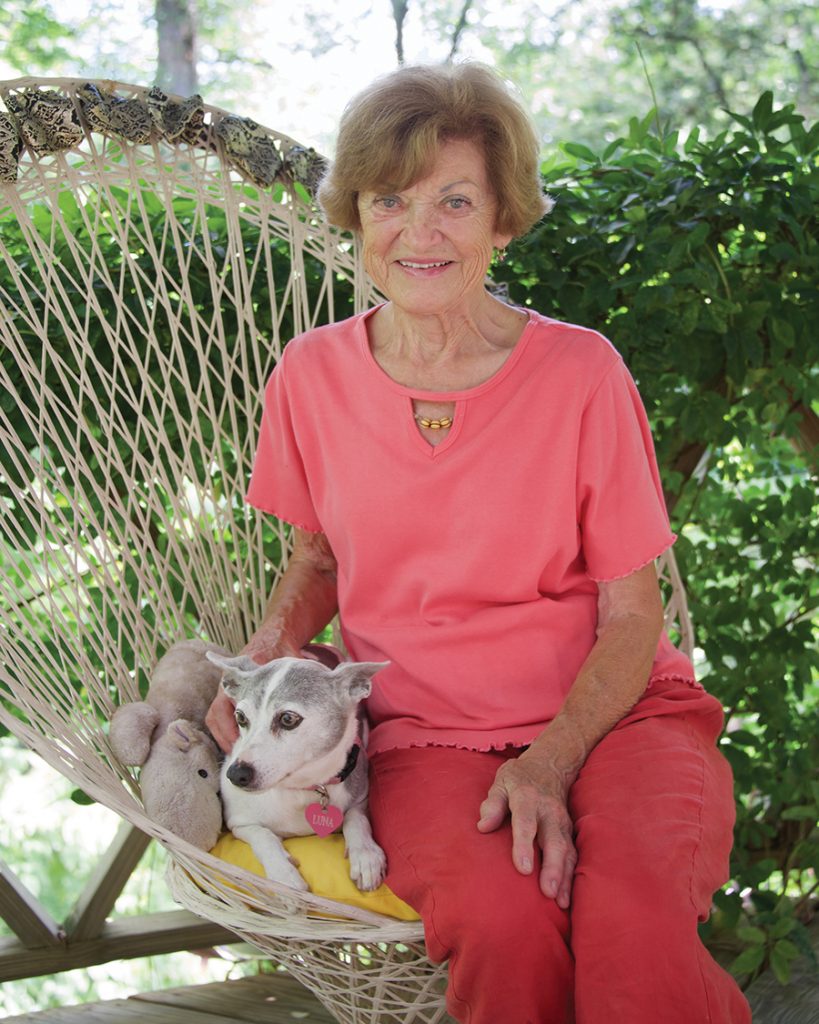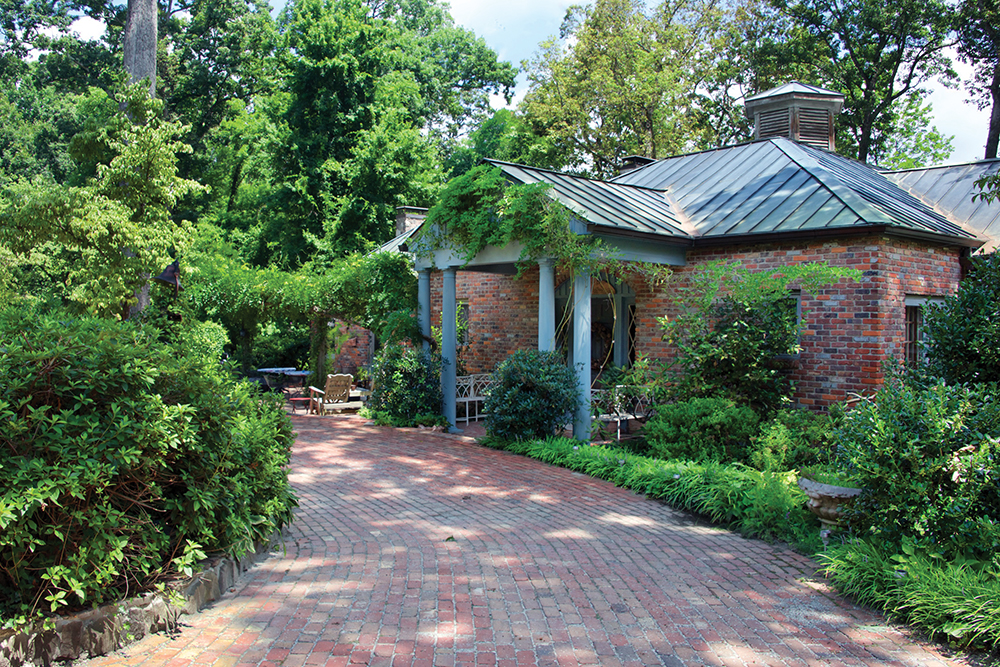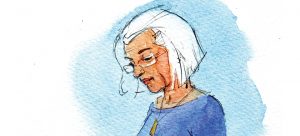
The life and times and gardens of Professor Peyton Hudson
By Ross Howell Jr. • Photographs By Lynn Donovan

If you enjoy adventurous spirits, then you need to meet Peyton Hudson.
Hailing from Maryland, she began her college studies at the University of Delaware. Though her father, a physician, wanted her to study medicine, she found her passion in textiles and fashion.
After a divorce in 1968, Hudson moved cross-country with two young daughters, Adrienne and Peyton, to Nevada, where she taught, worked as an extension agent and began working on a doctorate in textiles.
“I don’t know how I did it,” she said in a News & Record interview years ago. “I’m working on a degree, I’m teaching all the time, I’m putting a hot meal on the table every night, and it’s not out of a box.”
Hudson came to UNCG in 1971 to complete her Ph.D. A popular professor at the university, she later accepted a position at the N.C. State School of Textiles, now the College of Textiles.
She was something of a pioneer, one of just three women in that program. She wrote a textbook on manufacturing apparel and cowrote a textbook on the science of textiles. In 1995, she left academics to launch a successful consulting business.

Perhaps her most adventurous decision was made in 1975 when Hudson decided to purchase the main house and a 6-acre tract of land in Guilford College that was part of the old Guy M. Turner estate. Built in 1939, the big house had been added onto when Turner’s wife, Ida, was still living.
“Ida was from Virginia and she was a real gardener with true imagination,” Hudson says. “We’ve been able to reclaim most of her beds. You can still feel her spirit here, even though she passed away long before I bought this property. She must have seen herself as an FFV [First Family of Virginia], since she always had a cook and a maid to keep house — not to mention a full-time gardener.”
Hudson would have no such help. Worse, the property had been left vacant for three years. The house had mold problems and the gardens were choked with vines and weeds.
But Hudson was undaunted.
“I wanted to have a place where my daughters could ride their horses,” she says. “I could only get together enough financing for half the purchase price. So my parents signed a note for the other half.”
And then came a job offer in Raleigh: “I still had one daughter in high school in Greensboro,” she recalls. “It just didn’t seem right to try to go back and forth to work with a teenage daughter at home.” But she says her daughter, Peyton, insisted that she take the job. “Lo and behold,” Hudson says, “she was one of the students selected for the first group to study at the North Carolina School of Science and Math in Durham.”
Enter Howard Coble. The basement of the house was empty but had a huge fireplace and Hudson often used it for entertaining. “Well, one evening Howard Coble was over,” she says, referring to late U.S. Congressman (a UNCG scholarship was recently established in his memory.) “He was an officer in the Coast Guard then, still living at home with his parents,” Hudson continues. “He said he thought the basement would be a great place for him to live. So I said, ‘Well, I’ll fix up an apartment for you, Howard, but it will take a while, because I don’t have much money.’” Over time she added a bathroom, refrigerator, cook stove . . . “everything anybody would need to live there, and in 1978, Howard started renting it from me for $225 a month.”
After a number of years, Coble decided to run for Congress and was elected. “I decided since his situation and finances had improved, I’d raise his rent,” Hudson says. “Howard was very frugal, you know, and when I told him I was going to raise his rent to $250, he said he thought that was an absolutely outrageous amount to pay. So he bought a nice condominium in Guilford College.
“I think, too, he felt he’d reached a stage in his career where he believed some people would think it unseemly for him to be living in a basement apartment in somebody else’s house.”
Later, an assistant district attorney for Guilford County, Susan Bray, rented the apartment, which had come to be known as the “Congressional Suite.” Bray later bought a house nearby and is now the Resident Judge, North Carolina Superior Court, Eighteenth Judicial District.
“When Susan was living in the basement apartment,” Hudson says, “she used to joke that we should call it the ‘Congressional and Judicial Suite.’”
Hudson is telling me all this over the phone, as she prepares for yet another adventure, this time in the Midwest.
“I have so many things to take care of today, I think it would be just too rushed for us to get together now,” she says.
If Hudson is feeling rushed, you’d never know it. Her speech is measured, enthusiastic, confident. She’s booked tickets for a nine-day excursion on the Mississippi River aboard a paddle-wheeler sailing from Minneapolis (Red Wing), Minnesota, to St. Louis (Alton), Missouri — to celebrate her 81st birthday.
“Mark Twain has always been one of my favorite authors,” she says. “My daughter Peyton and I are sailing on a part of the river he used to navigate as a steamboat captain.” She pauses. “But you must have a look at the gardens. Just get in touch with Jim while I’m away. I’ll give you his number.”
And that brings us to the current basement apartment occupant, retired Greensboro police officer James Crabtree.
“When Jim moved in the apartment, Susan Bray said we should just call it ‘Law and Order,’” Hudson says. “She’s so clever! Anyway, Jim’s a great help with the gardens. But you know men. They won’t weed. And they never seem to think they’re accomplishing anything unless they’re making a lot of noise with something with a motor attached.”
That she’s sharing this view on the phone with a male gardener gives her no pause.
I express her sentiment to Crabtree after I park my car in the drive of Hudson’s home. The day is humid. He’s been working outside and his brow is sweaty. He listens, pursing his lips, so his moustache rises on one side.
“Seems like ladies always sing from the same hymnal,” he says. “I’d say I’m pretty good about the weeding. As for the motors, I always tell Peyton if she doesn’t keep her equipment in working order, then it won’t be there for her when she needs it.”
In Crabtree’s defense, there’s a lot to maintain.
Hudson’s beds start with plantings at the entrance, continuing down a long brick circular drive. There’s a profusion of Japanese maples, elephant ears, hydrangeas, coreopsis, cone flowers, wisteria, and many other plants and shrubs under a canopy of oaks, maples, magnolias, tulip poplars and mimosa.
In front of the house is a massive bed of old azaleas. In our conversation Hudson had told me to look for a post in the bed. I see it. Facing me, nearly covered with clematis, is a black metal plate in the shape of a steam locomotive with a number and the name, “Guy M. Turner.” A Chesapeake & Ohio locomotive bell, removed by a previous owner, had been mounted atop the post. Before Turner, the original owner of the property, started his own business, he had worked for the C&O Railway.
Near the post is a big owl statue, carved from cypress by an artist in Colfax. There are smaller forest creatures carved in the wood, including a terrapin and a frog. Near the owl statue is a garden where water spills over stone steps into a pool with water hyacinths boasting spectacular purple blossoms.
Next to the house is a bed of Queen Anne’s lace and dill, and at the foundations, a bed of ferns. Chocolate vine, trumpet vine, and wisteria festoon a bower beside the house and railings along the deck at the side all the way to the back of the house.
There are plants growing everywhere, not all of them invited. Bamboo grass and ragweed peek from some of the beds, and here and there, a poplar or oak sprouts. The sheer volume of vegetative life is comforting, and nearly overwhelming.
Oak sprouts sparked considerable consternation a few years back.
“Peyton just hates acorns,” Crabtree says, “because they’ll sprout in her beds. Well, one of her business clients wove these wide swaths of fabric on special machines — imported from Italy, I think.” Crabtree explains how the fabric was stretched on cables from tree to tree. “It was real shimmery, used mostly to make women’s underclothes and nightgowns, that kind of thing. ‘Nylon tricot’ is what Peyton calls it.
“Well, the canopies kept the acorns out of the beds like a charm,” Crabtree explains, “but the neighbors wondered what the heck was going on, with all this pink and blue stuff hanging in the trees. Some got pretty worked up about it.”
Crabtree grins, looking at me over the rims of his glasses.
“And Peyton hadn’t thought about Google,” he says. “You go to Google Maps and search the neighborhood, you’ll see a picture with big patches of pink and blue in the woods!”
I grin too, thinking about unintended consequences, and look across the brick drive to a vegetable garden with an electric fence to dissuade deer. Beyond is a garage with a small greenhouse attached. From there the land falls toward a lake, with a variety of plants under a continuing canopy of hardwoods.
We walk along the deck to the back of the house. There’s a door, the entrance to the basement apartment. By it is a plaque that reads, “J. Howard Coble U.S. House of Representatives Longest Serving N.C. Republican 2010 Slept Here 1978–1983.”

“I’d show you inside,” Crabtree says, “but I’m not much of a housekeeper.” He’s carefully weaving chocolate vine runners into the mass of foliage along the deck railing. I peer over the side, looking toward the lake. Directly below us is a gleaming white terrace, mulched with oyster shells.
“Before she decided on the brick,” Crabtree says, “Peyton was going to put in a tabby drive. I hauled those shells in a trailer from the old Green’s Supper Club. I was grinding them for the tabby, but then the grinder gave out, so Peyton decided to use them on the terrace.”
Crabtree explains that bamboo had invaded the area. “We were able to get rid of it using a formula of vinegar and salt. But a few stalks still volunteer. Peyton paints them with weed killer by hand.”
I notice little pink flags scattered on the bank near the lake.
“Oh, Peyton’s very careful to mark the wild ginger,” Crabtree says. “She says it’s common in the mountains, but here in the piedmont, it’s rare.”
The wild ginger hugs the earth, its heart-shaped, dark green variegated leaves glistening in the sunlight. A hummingbird whirs toward a flower bed beside the house, where yellow swallowtail butterflies are sampling blooms. Cicadas drone in the trees.
“People don’t realize all this is here,” Crabtree says. “Right here in Guilford College.”
The cicadas fall silent for a moment, as if breathless for the return of the lady of the house.
And in a few days, return she does. With a tale of adventure greater than a mere excursion on the mighty Mississippi. On her flights back from Missouri, a computer system failure left her stranded in the Atlanta airport for nearly twenty hours.
“They didn’t even offer us a cup of coffee,” Hudson says. “Just a cheap red polyester blanket! I haven’t slept in twenty-four hours. Did Jim show you the wild ginger?”
She’s chatty, articulate, funny, as we speak on the phone. If she’s tired, you’d never know it.
Peyton Hudson — professor, businesswoman, passionate gardener. OH
Ross Howell Jr. is at work on the project he wrote about in “So Delightful an Occupation,” an essay about Jefferson’s gardens in last month’s O. Henry, and, with a lone leaf clinging to a single stem of the Carolina allspice given him by a friend, hoping for a miracle.





